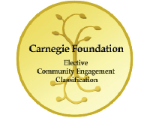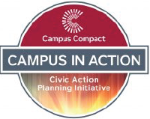Defining Engaged Scholarship
Borrowed from Brown University Swearer Center, the norms of engaged scholarship include:
-
Participatory epistemology: the co-creation of knowledge that shifts the position of students from knowledge consumers to knowledge producers and shifts community groups from being subjects or spectators of the research process to collaborators in knowledge generation and problem solving.
-
Collaborative research: recognizing an ecosystem of knowledge and acknowledging that the generation of new knowledge requires that academic knowledge be combined with community-based knowledge, eliminating a hierarchy of knowledge and a one-way flow of knowledge outward from the college or university.
-
Scholarly artifacts as publications: expanding the understanding and valuing of scholarly products beyond publication in highly specialized disciplinary journals.
-
Knowledge experts from outside the academy (peers): along with a valuing of the knowledge and experience that both academics and non-academics bring to the processes of education and knowledge production comes the reframing of who is a peer in the peer review process and the recognition that in certain circumstances the expert will be a non-credentialed, nonacademic collaborator.
-
Trans-disciplinarity: recognizing that interdisciplinary inquiry remains bounded by academic disciplines and that trans-disciplinarity is fundamentally different in that it combines multiple disciplinary knowledge within the college or university with knowledge that exists and is generated outside the college or university.
-
Impact: academic impact is conceived as “the advancement of scientific knowledge and activities that contribute to achievement of societally relevant outcomes” (NSF) and is shaped by examining the nature of the system within which knowledge is transformed into public policy or social action and how scholars engage others to transform research into actionable and useful knowledge.
These definitional characteristics distinguish community engaged scholarship from other forms of community and public scholarship:
-
Community-engaged scholarship and community-based scholarship: while scholarly work, whether through teaching or research, may be based in a community, locating the work in a community often means student/research placements, and transactional relationships rather than collaborative, reciprocal partnerships essential to community engagement.
-
Public scholarship and publicly engaged scholarship: Public scholarship typically refers moving beyond the walls of the academy to share knowledge generated in the academy with the public. Publicly engaged scholarship refers to moving beyond the walls of the academy to collaborate with community partners to generate knowledge. While publicly engaged scholarship may be considered public scholarship, public scholarship is not necessarily publicly engaged scholarship.
-
While both community-based scholarship and public scholarship are important activities and should be valued by institutions of higher education, they are not fully representative of the kinds of activities recognized by the Lynton Award.
-
Additionally, the Lynton Award conceptualizes scholarly engagement as grounded in a set of assumptions about knowledge and social change, explicitly advancing social justice in a diverse democracy. Community engagement addresses questions of power, privilege, politics, positionality, identity, and implication, and assumes that
-
The public purposes of higher education are knowledge creation and dissemination, AND cultivation of democratic values, skills and habits - democratic practice
-
The norms of democratic practice reflect the workings of privilege and power in time and place, and often lead to injustice at the individual, institutional, and societal level.
-
All scholarship examines, or reifies by non-examination, the workings of power and privilege as context and constituent of knowledge creation and dissemination and therefore has a political agenda.
Thus, engaged scholarly work must critically examine (historical, racial, economic, gender, social, etc.) contexts of knowledge production- past, present, and future- as part of every scholarly project.








